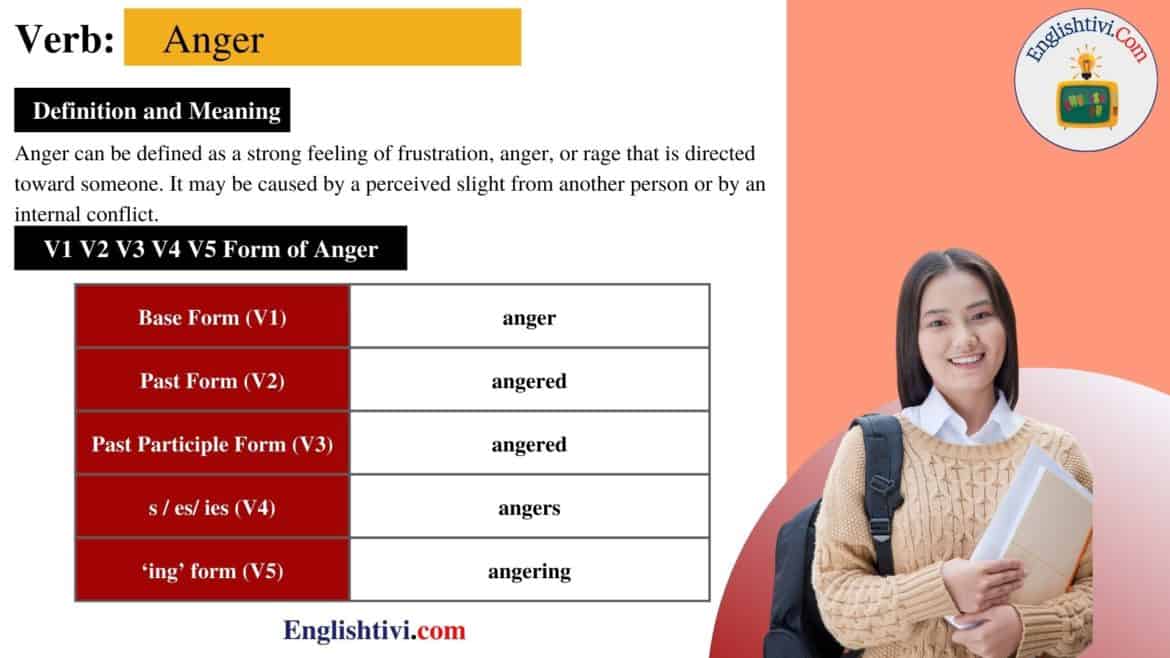Anger V1 V2 V3 V4 V5 is one of the verbs that are used very commonly in English tests as well as in everyday communication. Also, because it’s an irregular verb, anger doesn’t follow the regular rule. The verb “anger” has five different forms: base form, past simple, past participle form, present perfect, and present perfect participle. So what is anger‘s past? How do conjugate verbs with anger verbs?
⏩ Sign Up to Get Bonus
Let’s find out with English tivi in the article below.
See more at: Verbs
Anger of Definition and Meaning
Anger can be defined as a strong feeling of frustration, anger, or rage that is directed toward someone. It may be caused by a perceived slight from another person or by an internal conflict.
V1 V2 V3 V4 V5 Form of Anger
| Base Form (V1) | anger |
| Past Form (V2) | angered |
| Past Participle Form (V3) | angered |
| s / es/ es (V4) | angers |
| ‘ing’ form (V5) | angering |
Anger of Past Simple V2
The verb Anger is also employed in its V2 form as “angered”’. It is used to indicate the past tense in sentences.
Anger of Past Participle V3
The V3 form is identical to the V2 form. The V3 form is “angered”. Angered is used in the past or present perfect tense.
+ In the present perfect tense, we use the word V1 as ‘have + angered or ‘has + angered.
- I, you, and we are used as ‘have + angered.
- ‘has + angered' is used for he, she, and it.
+ If you need to use the past perfect tense, use ‘had + angered‘ regardless of the subject.
You might also like: ALL the English Grammar Basics You Need
Conjugation of Anger V1 V2 V3 V4 V5
Conjugation table: Anger | |||
| Number | Singular | ||
| Present Simple of anger | I | You | She/He/It |
| anger | anger | angers | |
| Plural | |||
| We | You | They | |
| anger | anger | anger | |
| Present Continuous of anger | I | You | She/He/It |
| am angering | are angering | is angering | |
| Plural | |||
| We | You | They | |
| are angering | are angering | are angering | |
| Present Perfect of anger | I | You | She/He/It |
| have angered | have angered | has angered | |
| Plural | |||
| We | You | They | |
| have angered | have angered | have angered | |
| Present Perfect Continuous of anger | I | You | She/He/It |
| have been angering | have been angering | has been angering | |
| Plural | |||
| We | You | They | |
| have been angering | have been angering | have been angering | |
| Past Simple of anger | I | You | She/He/It |
| angered | angered | angered | |
| Plural | |||
| We | You | They | |
| angered | angered | angered | |
| Past Continuous of anger | I | You | She/He/It |
| was angering | were angering | was angering | |
| Plural | |||
| We | You | They | |
| were angering | were angering | were angering | |
| Past Perfect of anger | I | You | She/He/It |
| had angered | had angered | had angered | |
| Plural | |||
| We | You | They | |
| had angered | had angered | had angered | |
| Past Perfect Continuous of anger | I | You | She/He/It |
| had been angering | had been angering | had been angering | |
| Plural | |||
| We | You | They | |
| had been angering | had been angering | had been angering | |
| Future Simple of anger | I | You | She/He/It |
| will/shall anger | will/shall anger | will/shall anger | |
| Plural | |||
| We | You | They | |
| will/shall anger | will/shall anger | will/shall anger | |
| Future Continuous of anger | I | You | She/He/It |
| will/shall be angering | will/shall be angering | will/shall be angering | |
| Plural | |||
| We | You | They | |
| will/shall be angering | will/shall be angering | will/shall be angering | |
| Future Perfect of anger | I | You | She/He/It |
| will/shall have angered | will/shall have angered | will/shall have angered | |
| Plural | |||
| We | You | They | |
| will/shall have angered | will/shall have angered | will/shall have angered | |
| Future Perfect Continuous of anger | I | You | She/He/It |
| will/shall have been angering | will/shall have been angering | will/shall have been angering | |
| Plural | |||
| We | You | They | |
| will/shall have been angering | will/shall have been angering | will/shall have been angering | |
| Conditional Present of anger | I | You | She/He/It |
| would anger | would anger | would anger | |
| Plural | |||
| We | You | They | |
| would anger | would anger | would anger | |
| Conditional Perfect of anger | I | You | She/He/It |
| would have angered | would have angered | would have angered | |
| Plural | |||
| We | You | They | |
| would have angered | would have angered | would have angered | |
| Conditional Present Continuous of anger | I | You | She/He/It |
| would be angering | would be angering | would be angering | |
| Plural | |||
| We | You | They | |
| would be angering | would be angering | would be angering | |
| Conditional Perfect Continuous of anger | I | You | She/He/It |
| would have been angering | would have been angering | would have been angering | |
| Plural | |||
| We | You | They | |
| would have been angering | would have been angering | would have been angering | |
| Present Subjunctive of anger | I | You | She/He/It |
| anger | anger | anger | |
| Plural | |||
| We | You | They | |
| anger | anger | anger | |
| Past Subjunctive of anger | I | You | She/He/It |
| angered | angered | angered | |
| Plural | |||
| We | You | They | |
| angered | angered | angered | |
| Past Perfect Subjunctive of anger | I | You | She/He/It |
| had angered | had angered | had angered | |
| Plural | |||
| We | You | They | |
| had angered | had angered | had angered | |
| Imperative of anger | I | You | She/He/It |
| anger | |||
| Plural | |||
| We | You | They | |
| Let’s anger | anger | ||
See more at: Vocabulary
Example Sentences with Anger V1 V2 V3 V4 V5
In this section, we will learn about anger sentence examples:
- I'm angered because he keeps talking in my ear.
- He always angers people off. That makes him happy.
- The boy is angering his friend by repeating his friend's words.
- They will be kicked out of the house if they anger their parents.
Synonym Words For Anger
Synonym of anger word list. Here are a variety of words whose meaning is nearly the synonym of anger:
- enrage
- annoy
- incense
- infuriate
- provoke
- gall
- irritate
- madden
- exasperate
- vex
- displease
- pique
- rile
- aggravate
- antagonise
- inflame
Opposite Words For Anger
The antonym of anger word list. Here are some words that have nearly the opposite meaning as anger:
- placate
- pacify
- allay
- assuage
- conciliate
- console
- please
- relieve
- settle
- delight
- gratify
- appease
- calm
- soothe
- aid
- alleviate
- assist
- bore
- comfort
- compose
You might also like: Best List of Irregular Verbs in English
Some Frequently Asked Questions About Anger (Verb)
What is the V1 V2 V3 V4 V5 of anger?
The past tense of anger is angered. The third-person singular simple present indicative form of anger is angers. The present participle of anger is angering. The past participle of anger is angered.
| Base Form (V1) | anger |
| Past Form (V2) | angered |
| Past Participle Form (V3) | angered |
| s / es/ es (V4) | angers |
| ‘ing’ form (V5) | angering |
What is the V2 and V3 form of anger?
+ The V2 and V3 form of anger is “angered“.
What is the sentence of anger?
What is the past tense V2 of anger?
+ The past tense of anger is “angered“.
What is the past participle V3 of anger?
+ The past participle of anger is “angered“.
What is the present participle V5 of anger?
+ The present participle of anger is “angering“.
Conclusion
Let’s learn with English TV the structure of the verb “Anger V1 V2 V3 V4 V5“: Base Form, Past Simple, Present Continuous and Present Continuous and Present Continuous and Present Continuous forms. We wish you all the best of luck.
You should subscribe to the English TV YouTube channel if you want to learn more about the English language and improve your proficiency.





